Adaptec’s Series 8 line are 12Gb/s RAID adapters featuring an end-to-end PMC architecture that incorporates PMC’s I/O protocol controllers, RoC controllers, SAS expanders, and software. The Adaptec Series 8 cards boast a significant performance improvement compared to its previous generation of adaptors, as they are quoted to be significantly faster than their predecessors. The Series 8 cards are also equipped with maxCache Plus technology, which supports both caching and tiering functionality and allows IT managers, system integrators, and ISV’s to reap the fastest performance and best overall value from their storage systems. maxCache Plus also provides users the flexibility to configure their storage devices in server environments as well as allowing the fastest media to be used as storage instead of only cache. As a result, this maximizes the potential of the newest 12Gb/s drives on the market.
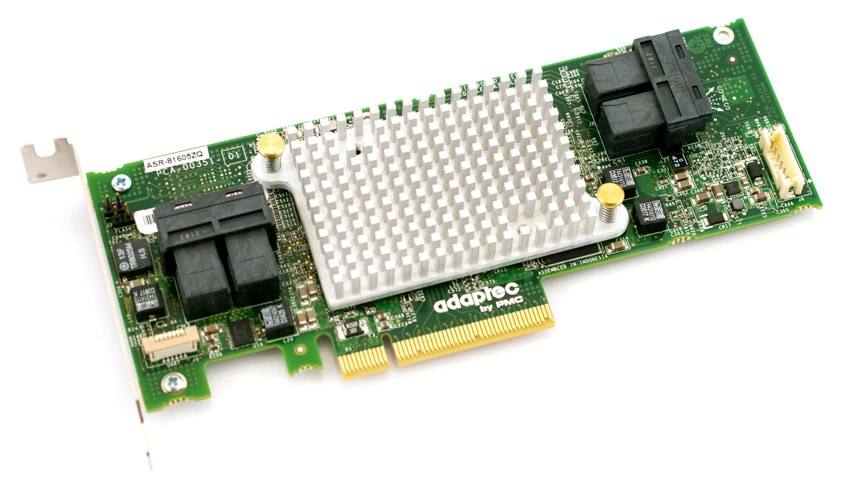
We previously reviewed the Adaptec Series 7 line (71605Q), and were satisfied with its performance in regards to throughput; however, we were most impressed by its tremendous flexibility of 24 ports without the need for expanders, setting a new versatility bar for the market. During that time, Adaptec was in (and still is) fierce competition LSI, where both LSI and Adaptec were vying to have either high port count or high performance. Series 8, however, gives enterprises a port count of 16 as well as boasting and impressive port bandwidth of 12Gbps, demonstrating that Adaptec wants to push the market even further. This persistent innovation is helping pave the way for Adaptec to be, they hope, the most dominant force in the RAID adapter market.
Adaptec’s Series 8 line has five different models:
- 81605ZQ: This is the card we are using in our Supermicro file server, which has 16 internal ports with Flash backup (embedded) Supercap (included) cache protection.
- 8885 and 8885Q: 8 internal and 8 external ports; the 8885Q is equipped with optional AFM-700 cache protection.
- 8805: The only card of the 8-Series line with 8 (internal) ports in total.
All models support RAID levels 0, 1, 1E, 5, 6, 10, 50, 50 and 60.
The 8885 and 8885Q are currently going for $725.00 and $1100.00 respectively, while the 81605ZQ and 8805 are available for $1065.00 and $640.00. All versions ship with a three-year warranty. Our review will be focusing on the 81605ZQ unit.
Adaptec 8-series RAID Controller Specifications
8160ZQ
- Order Part Number: 2281600-R (Single)
- RAID Levels: 0,1,1E,5,6,10, 50, 60
- Form Factor:
- MD2 – Low Profile
- 2.535”H x 6.6”L (64mm x 167mm)
- Ports: 16 Internal
- Connectors: 4 X SFF-8643
- Bus Interface: 8-Lane PCIe Gen3
- Processor: PMC PM8063
- Cache: 1024MB
- Cache Protection: Flash backup (embedded) Supercap (included)
8885Q
- Order Part Number: 2277100-R (Single)
- RAID Levels: 0,1,1E,5,6,10, 50, 60
- Form Factor:
- MD2 – Low Profile
- 2.535”H x 6.6”L (64mm x 167mm)
- Ports: 8 Internal/8 External
- Connectors:
- 2 x SFF-8643
- 2 x SFF-8644
- Bus Interface: 8-Lane PCIe Gen3
- Processor: PMC PM8063
- Cache: 1024MB
- Cache Protection: AFM-700 (included)
8885
- Order Part Number: 2277000-R (Single)
- RAID Levels: 0,1,1E,5,6,10, 50, 60
- Form Factor:
- MD2 – Low Profile
- 2.535”H x 6.6”L (64mm x 167mm)
- Ports: 8 Internal/8 External
- Connectors:
- 2 x SFF-8643
- 2 x SFF-8644
- Bus Interface: 8-Lane PCIe Gen3
- Processor: PMC PM8063
- Cache: 1024MB
- Cache Protection: AFM-700 (optional)
8805
- Order Part Number: 2277500-R (Single)
- RAID Levels: 0,1,1E,5,6,10, 50, 60
- Form factor:
- MD2 – Low Profile
- 2.535”H x 6.6”L (64mm x 167mm)
- Ports: 8 Internal
- Connectors: 2 X SFF-8643
- Bus Interface: 8-Lane PCIe Gen3
- Processor: PMC PM8063
- Cache: 1024MB
- Cache Protection: AFM-700 (optional)
General specifications:
- Physical Dimensions: 2.535”H x 6.6”L (64mm x 167mm)
- Operating Temperature: 0°C to 55°C* (with 200 LFM airflow, without flash); 0°C to 50°C* (with 200 LFM airflow, with flash)
- Operating Current: 1.0A @ 3.3 VDC; 1.1A @ 12.0 VDC 8805, 8885, 8885Q; 1.5A @ 3.3 VDC; 1.0A @ 12.0 VDC 81605ZQ
- Regulatory Certification CE, FCC, UL, C-tick, VCCI, KCC, CNS
- Environmental Compliance RoHS
- MTBF In Test Now
- Warranty: 3 years
Build and Design
At the heart of each new 8-series Adaptec RAID card is the PM8063 RAID-on-Chip controller, which interfaces with the host system through an 8-lane PCIe Gen3 connection offering up to 8GB/s of raw bandwidth combined with inline XOR to reduce DDR3 access to maximize performance. The PM8063 supports 16 devices at native 12Gb/s speeds. For the purposes of this review, we center around the new 81605ZQ, which offers support for 16 internal devices, as well as an integrated flash module (without needing an add-on daughter board) for data protection in the event of a power-fail scenario.
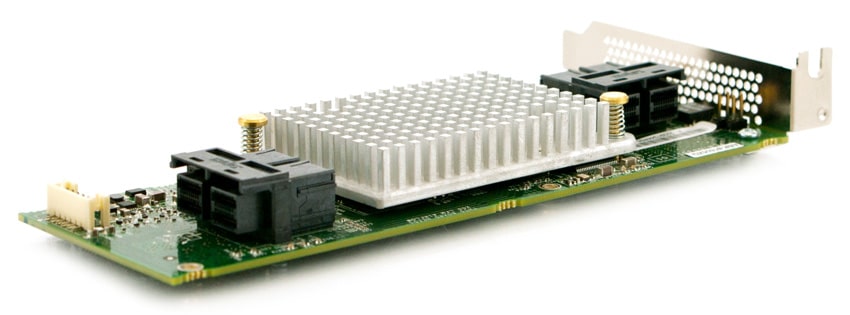
The 81605ZQ is offered in a compact HHHL form-factor with its flash backup feature fully integrated. This is different from the other cards in this Adpatec series which require add-on daughter boards to enabled this functionality. The advantage of this layout is readily visible in that the space usually required for the add-on card is now occupied by two additional rear-facing mini SAS HD ports. While the other Adaptec 8-series cards also support 16 devices, none of them offer 16-internal ports. Instead they offer a combination of 8-internal and 8-external ports. The only external attachment needed for the 81605ZQ is a backup battery, which can be remotely located pretty much anywhere within reach inside your server chassis. In the case of our Supermicro SuperStorage Server 2027R-AR24NV we were able to position the batteries directly behind the front storage bays in the coolest airflow available inside the chassis.
Lastly, are the SFF-8643 internal connectors; the adapter connects through a PCIe Gen3 x8 slot; however, it is also backwards compatible with PCIe Gen2 systems. The 81605ZQ adapter is not equipped with external connectors, though two other models do, the 8885 and 885Q, which gives them quite a bit of flexibility.
Testing Configuration
The Adaptec 8-series 81605ZQ card is used in our Supermicro SuperStorage Server 2027R-AR24NV running Windows Server 2012 R2, acting as file server to the StorageReview Test Lab. The SuperStorage Server AR24NV is a high-end storage platform that is specifically designed to take advantage of leading SAS3 storage devices.
The two main subsystems of the AR24NV include the SC216A-R920LPB 2U 24-bay chassis and X9DRH-iF-NV dual-processor serverboard. Its most important feature, however, is an all-new 24-bay SAS3 12Gb/s direct-attached backplane optimized for the latest generation of SSDs, which is where the Adaptec 8-series comes in to play.
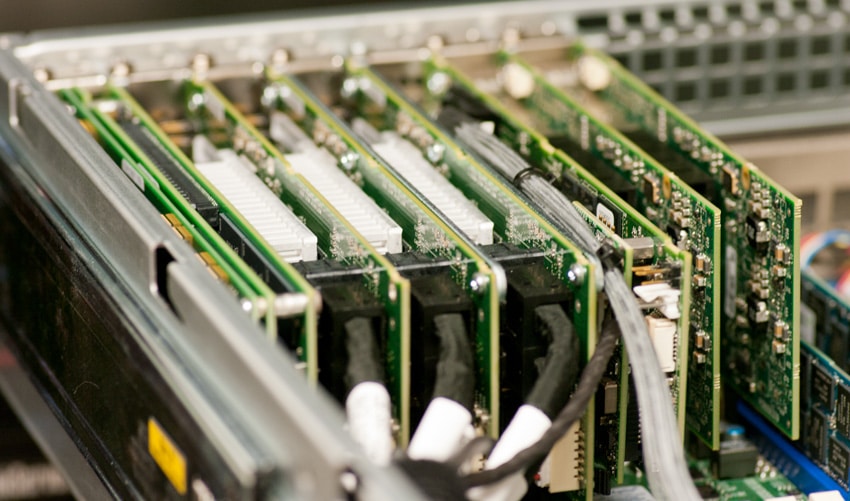
We installed three Adaptec 81605ZQ cards to connect to four SSD drive pools. In our high-performance configuration for testing, we included 16 Hitachi SSD800MM 400GB SSDs, 8 Micron M500 960GB SSDs, as well as 2 Seagate SSD 600 480GB SSDs. We had the groups split up to 8 SSD800MM SSDs to two Adaptec 81605ZQ cards, with the last connected to the 8 Micron SSDs and 2 Seagate SSDs. In our configuration geared towards optimal performance, we had two RAID10 SAS3 pools made up of the Hitachi SSDs, one RAID50 pool of the Micron SSS, and one last RAID1 pool of the Seagate SSDs for boot.
To measure the performance of the 81605ZQ in a real-world environment we created SMB3, iSCSI and NFS shares in Windows Server 2012 R2 and accessed them over our 10GbE end-to-end infrastructure. For the HGST SSD800MM tests, we had two 25GB shares or LUNs on each RAID10 storage pool (four shares or LUNs total) or four shares or LUNs on the single RAID50 Micron M500 storage pool. For these four connections we used a dedicated 10GbE port each to give them as much bandwidth as they would require.
Enterprise Synthetic Workload Analysis
Our enterprise benchmark process preconditions each storage device into steady-state with the same workload the device will be tested with under a heavy load of 16 threads with an outstanding queue of 16 per thread, and then tested in set intervals in multiple thread/queue depth profiles to show performance under light and heavy usage.
Preconditioning and Primary Steady-State Tests:
- Throughput (Read+Write IOPS Aggregate)
- Average Latency (Read+Write Latency Averaged Together)
- Max Latency (Peak Read or Write Latency)
- Latency Standard Deviation (Read+Write Standard Deviation Averaged Together)
Our Enterprise Synthetic Workload Analysis includes profiles based on real-world tasks. These profiles have been developed to make it easier to compare to our past benchmarks as well as widely-published values such as 8k 70/30 which is commonly used for enterprise products.
- 8k 70/30
- 70% Read, 30% Write
- 100% 8k
We focused on our 8k 70/30 workload, since in our virtualized Enterprise Test Lab with more than 100VMs active across different tests, random workload performance is key. While our VMware-heavy environment leverages iSCSI, SMB3 and NFS performance figures were also included to see how well Windows Server 2012 R2 performed for each protocol.
In the first test measuring throughput the sixteen Hitachi SSD800MM SAS3 SSDs in two RAID10 pools accessed over SMB3 offered the best overall performance at every depth peaking over 160,000 IOPS, easily beating its iSCSI or NFS shares which topped at 78k IOPS and 37k IOPS respectively. The Micron M500 RAID50 pool offered SMB3 performance topping at 55k IOPS, with iSCSI and NFS trailing with top figures of 52k IOPS and 11.4k IOPS respectively.
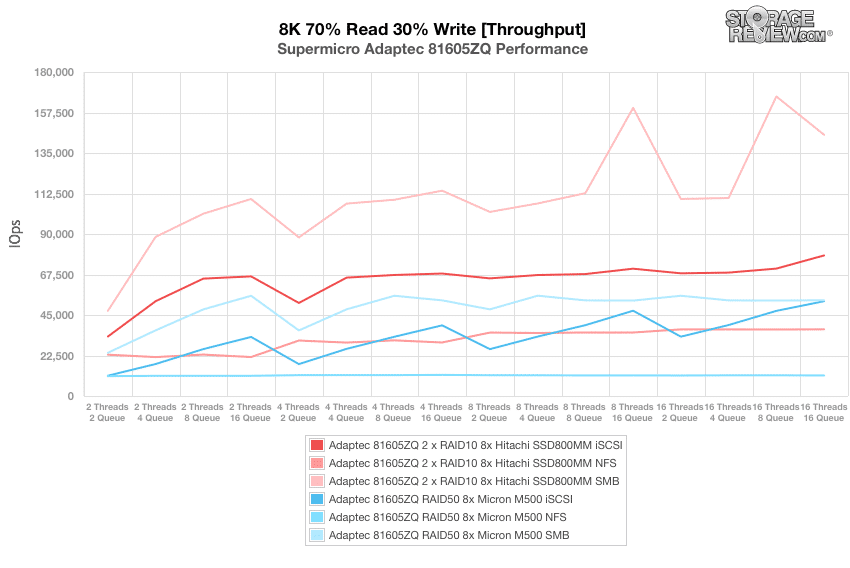
The Hitachi SSD800MM 2xRAID10 configuration over SMB3 offered the lowest overall average latency, scaling from 0.33ms at 2T/2Q up to 7.05ms at 16T/16Q. Our Micron M500 storage pool in RAID50 scaled from 0.66ms at 2T/2Q up to 19.24ms at 16T/16Q.
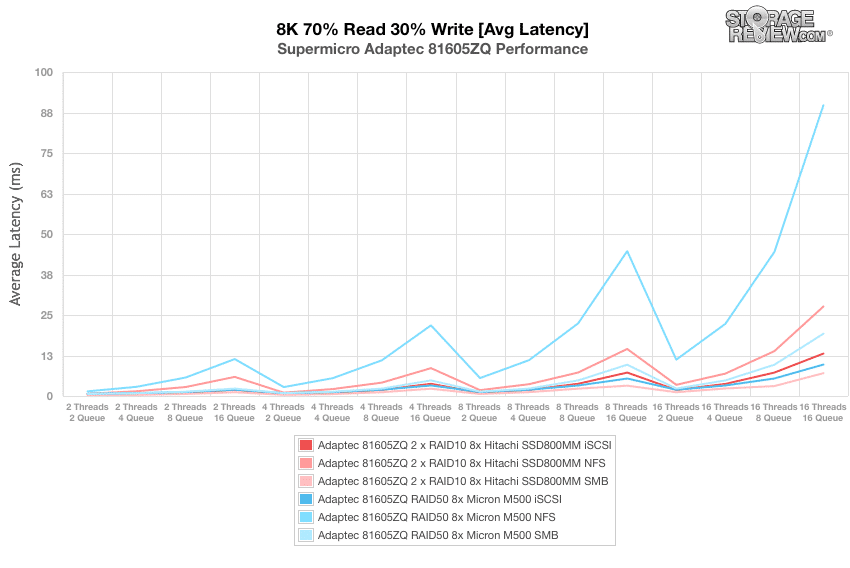
Most of the drive configurations scored extremely well in the Max Latency tests, especially the Micron drive, which showed virtually no spikes whatsoever. The Hitachi SSD800MM 2xRAID10 through Windows Server 2012’s iSCSI container, however, spiked quite high with a maximum latency reaching over 10,500ms which may have been from what the upper limit that Windows can support through that protocol.
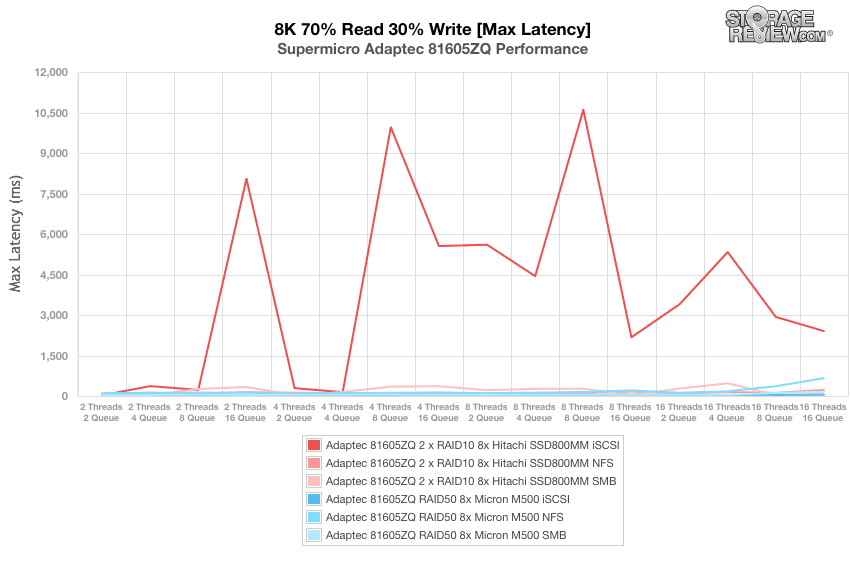
Among the SSDs, the Micron M500 RAID50 storage pool over SMB3 narrowly beat the Hitachi SSD800MM SMB3 to offer the narrowest standard deviation at the 16T/16Q level. The HGST storage pool over iSCSI as well as the Micron storage pool over NFS spiked quite a bit during these tests and had with a much higher standard deviation by the end.
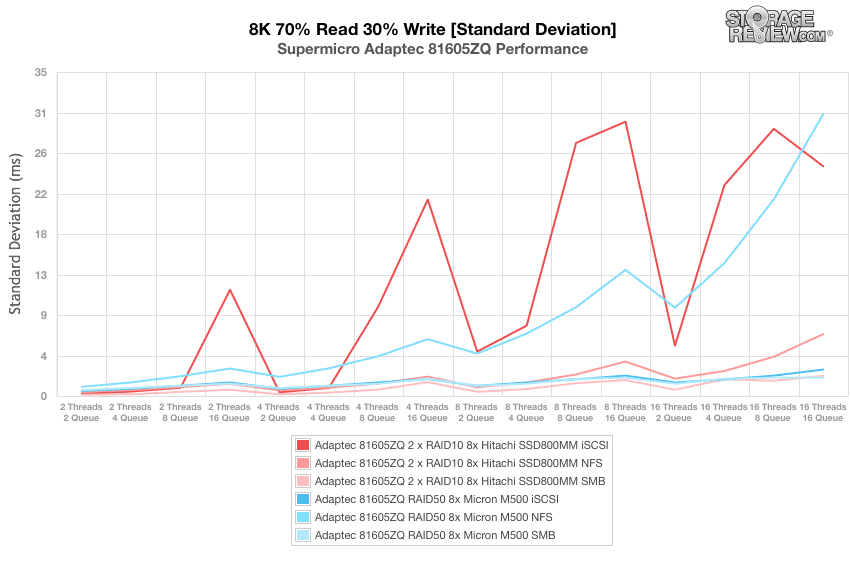
Conclusion
The Adaptec Series 8 81605ZQ has a lot to offer as a top-tier RAID card offering, with 16 12Gbps SAS ports as well as on-board power fail protection without having to add any additional daughter board. As far as list prices go, the 8-series RAID card family isn’t priced too different than the 7-series cards they replace. In the case of the 16-port 81605ZQ ($1,065), it is actually listed less than the list price of the 71605Q ($1,100), which will make it a compelling option for those looking at purchasing new equipment that can support the latest standards.
Adaptec again shows system integrators, OEMs and roll-your-own IT admin that the Series 8 RAID cards have a lot to offer. With twice the port density of competitive offerings, server vendors can seriously contemplate maxing out PCIe Gen3 throughput with high-end SAS SSDs with less complex builds that skip expanders. Adaptec continues to evolve their software offerings as well with max Cache Plus, which allows for both caching and tiering.
In our testing in a Windows Server 2012 R2 environment hosting shared storage to our virtualized environment, the Adaptec Series 8 81605ZQ performed quite well, in some cases pushing Windows to its limits for different storage protocols. Leveraging the performance of sixteen HGST SSD800MMs in two RAID10 pools leveraging as many 81605ZQ cards, we saw 8k 70/30 performance top 160k IOPS over SMB3. On our third 81605ZQ used to control our RAID1 boot drive and a RAID50 pool of Micron M500 SSDs, we saw SMB3 performance topping 55k IOPS in that same random I/O test. Needless to say, the lab is enthusiastic about continuing to deploy the Series 8 cards throughout a variety of upcoming projects that feature high-performance storage.
Pros
- Incredible performance
- Reasonably priced for the enterprise market
- Up to 16 12GB/s SAS ports
Cons
- No 24 port count model like the Series 7
Bottom Line
The Adaptec Series 8 line is a perfect fit for enterprises looking to vastly improve the performance of their resource-intensive applications or dense server environments at a top-in-class level. The 8160ZQ in particular offers great data protection with its integrated flash module, which eliminates the need for an add-on daughterboard and the 16 ports offer tremendous in-system flexibility.
Adaptec Series 8 RAID Cards at AmazonDiscuss This Review




 Amazon
Amazon